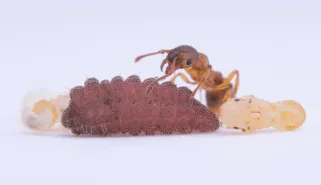Common molecules made by bacteria in the gut may act as chill pills for the immune system. Molecules secreted by intestinal bacteria work to prevent misplaced immune attacks in inflammatory bowel diseases like colitis, a new study finds.
“It is a huge advance,” says Sarkis Mazmanian of Caltech. “This opens up the notion that a very easy and potentially very safe therapy for inflammatory bowel disease could exist.”
Decades of research have hinted that microbes play a role in immune-related diseases such as obesity, allergy, inflammatory bowel disease and colon cancer. But scientists have had difficulty pinpointing direct links between the bacteria in the gut and the army of immune cells that live there.
Some researchers have focused on individual microbial species among the gut’s teeming hordes to see how they affect the immune system. But Wendy Garrett’s team at Harvard University decided to look instead for possible immune tamers among the various molecules that many different bacteria make. The team chose to investigate short-chain fatty acids because bacterial species that make large amounts are in short supply in some people with inflammatory bowel disease.
To see whether the microbial molecules play a role in quieting the immune system, the researchers added them to mice’s drinking water. The animals developed elevated levels of inflammation-dousing regulatory T cells in their colons, the team reports July 4 in Science. The cells work like wet blankets, dampening autoimmune flare-ups before they burn out of control.
The team also found that those short-chain fatty acids protected the mice from an experimental form of colitis, an immune disease that destroys the colon.
Garrett hopes that the acids play the same role in tamping down inflammation in people. Many bacterial species that inhabit the guts of humans also produce the acids. And people might not even have to take the fatty acids as drugs. Eating higher amounts of dietary fiber might also do the trick because the microbes consume fiber to make the acids.
Studies have shown that, compared with people in some developing countries, westerners tend to consume lower amounts of dietary fiber and have lower amounts of short-chain fatty acids in their guts. They also have higher — and increasing — levels of inflammatory bowel disease.
The study suggests that a lack of dietary fiber could reduce levels of short-chain fatty acids in the gut and might explain that elevated prevalence of inflammatory bowel disease, says gut microbiologist Justin Sonnenburg at Stanford University. “A really good hypothesis at this point is that reduced short-chain fatty acid production over time is bad for colonic health.”






